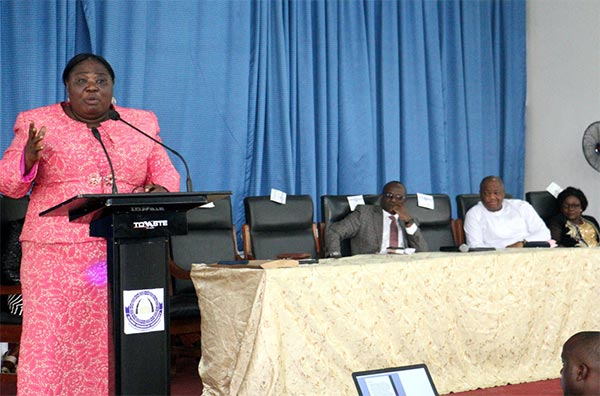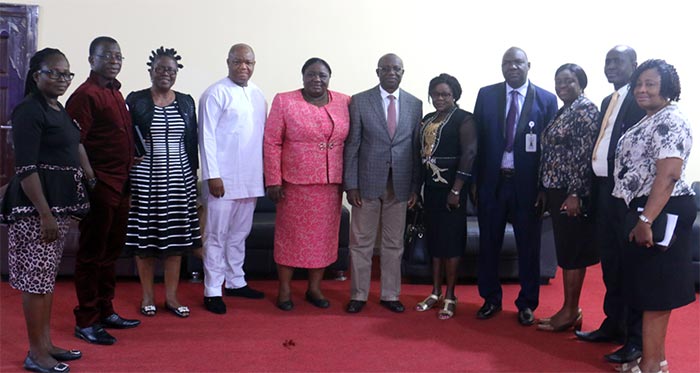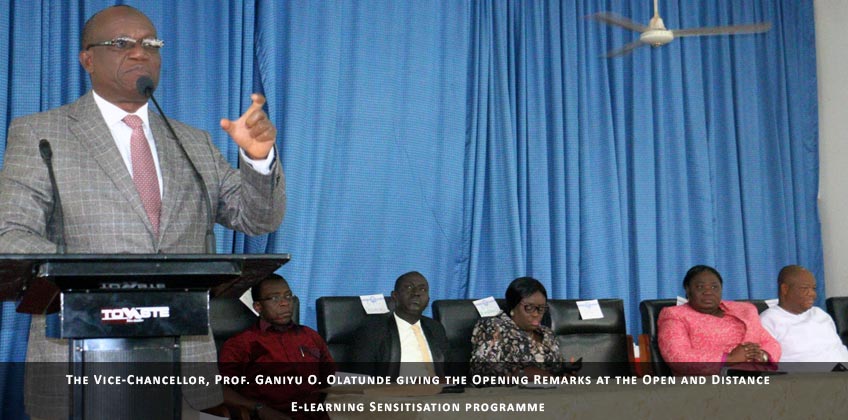In his determination to continue to place the University on higher stead towards making it a world class citadel of learning in no distant time, the University Management under the leadership of Prof. Ganiyu Olatunji Olatunde has concluded arrangements to join the “Dual Mode” institutions of the world, where technology especially telecommunication would be deployed to mediate learning for knowledge dispensing. This developmental initiative of the current administration in the University was unveiled at the sensitisation event held at the OGD hall of the University, on Thursday, 5th September, 2019, where the University Community was fully informed of all it would require in terms of human, material, and financial resources to commence an Open and Distance E-Learning.

In his opening remarks, the Vice-Chancellor, Professor Ganiyu Olatunji Olatunde who welcomed all, especially the resource persons to the sensitisation programme, expressed concerns over the rate at which Nigerian youths, who are willing and qualified, are denied access to tertiary education, year-in, year-out due to inadequate space occasioned by the limited carrying capacities of the Nigerian Universities. He stated that out of about 1.5 Million candidates that wrote the UTM Examinations in 2018/2019 Session, about 1.2 Million had the minimum pass mark, while only about 50% of those that passed the UTME secured admission into Nigeria Tertiary institution, adding that the trend might not be different in the on-going 2019/2020 admission exercise.
While acknowledging that the situation portend a dangerous trend to the society, the university’s helmsman revealed that the university administrators in their wisdom had taken upon themselves to consider options of rescuing these categories of In his determination to continue to place the University on higher stead towards making it a world class citadel of learning in no distant time, the University Management under the leadership of Prof. Ganiyu Olatunji Olatunde has concluded arrangements to join the “Dual Mode” institutions of the world, where technology especially telecommunication would be deployed to mediate learning for knowledge dispensing. This developmental initiative of the current administration in the University was unveiled at the sensitisation event held at the OGD hall of the University, on Thursday, 5th September, 2019, where the University Community was fully informed of all it would require in terms of human, material, and financial resources to commence an Open and Distance E-Learning.
In his opening remarks, the Vice-Chancellor, Professor Ganiyu Olatunji Olatunde who welcomed all, especially the resource persons to the sensitisation programme, expressed concerns over the rate at which Nigerian youths, who are willing and qualified, are denied access to tertiary education, year-in, year-out due to inadequate space occasioned by the limited carrying capacities of the Nigerian Universities. He stated that out of about 1.5 Million candidates that wrote the UTM Examinations in 2018/2019 Session, about 1.2 Million had the minimum pass mark, while only about 50% of those that passed the UTME secured admission into Nigeria Tertiary institution, adding that the trend might not be different in the on-going 2019/2020 admission exercise.
While acknowledging that the situation portend a dangerous trend to the society, the university’s helmsman revealed that the university administrators in their wisdom had taken upon themselves to consider options of rescuing these categories of desires to attain the status of dual mode institution, just like they do to the regular programmes.
While acknowledging that ODL had no one definition, Dr. Adesina opined that Open and Distance E-Learning as “that mode of learning that seeks to remove the constraints of time, pace and space, so that as many people as possible are able to take advantage of meaningful learning opportunities throughout their lives”. She further disclosed that while learning takes place through print, electronic and or telecommunication media system of delivering learning content, this mode of learning is characterised with a situation where teaching behaviours are spatially separated from learning behaviours.
Speaking on the pre-requisites of Distance Learning Centre for any desiring institution, the NUC Director stressed that detailed planning, adequate funding, provision of strong leaner support, copious and varied capacity building workshops for personnel, including Course Material Developers, Facilitators, E-tutors, Management and Technical staff were among the fundamentals of this virtual mode of learning. The intending institution must also have the capacity of deploying appropriate technologies, engaging local ICT firms, and pay working visits to at least 2 successful Distance Learning Centres, she added.
She further stressed that even though weak quality assurance mechanisms, poor publicity, inadequately trained personnel, limited and unreliable ICT access and controversial content dimension had been confronting its success, the huge need for access to tertiary education, economies of scale for small countries, growing trend of ephemeral knowledge, necessity for lifelong learning, flexibility, versatility and robust outreach will continue to fuel growth in distance learning. “Its benefits also included scalability by widening access, making education inclusive by breaking barriers posed by culture, religion, war, and politics, making learners to tackle their studies at their own pace and in the comfort of their home environment, while utilizing minimum workforce to achieve maximum productivity among others”, she added.
Similarly, the Director, Distance Learning Centre, University of Ibadan, Prof. Oyesoji Aremu, whose lecture centred on the overview of distance education based on the experience of University of Ibadan ODL centre, stressed the need for the sensitisation programme in institutions that desired Open and Distant E-Learning in the country, at least to free them from the teething and other problems experienced by those already operating the dual learning mode. He, therefore, commended the management of Olabisi Onabanjo University, Ago-Iwoye for deeming it fit to sensitise the would-be personnel/technical hands of the ODL Centre, which he affirmed as not only most feasible means of expanding access to quality higher education, but also an economically sound venture. He noted that in Nigeria, University of Ibadan, Ibadan, Obafemi Awolowo University, Ile-Ife, University of Lagos, Lagos, Ahmadu Bello University, Zaria, Lagos State University, Ojo, Lagos and few others have adopted the new sobriquet, ‘Dual Mode University’.
Speaking further, Prof. Aremu stressed that ODL had also taken the advantages of advances in multimedia and technology in evolving new and innovative methods in taking care of every aspect of teaching and learning in the regular face-to-face mode of education delivery. For instance “video conferencing software makes it possible to recreate a classroom in virtual reality, social networking sites can be used for real time learning/interaction and research, cloud computing technology could also assist in online collaboration, while Learning Management Systems allow anyone with little technical knowledge to create a course and present their expertise online, and are making dissemination of knowledge easier, more effective and affordable”, he said.
In his final submission, Prof. Aremu identified three key models for online delivery that institutions can develop to deliver online education based on experience. These, he said included outsourcing some or all of the online education activities to commercial service providers, subcontractors (for example project managers, content experts, instructional designers, editors, web producers, artists, content reviewers, programmers, as well as marketers), learning management systems (including hosting, instructor training, technical support and storage of course content and student activity records) which may be outsourced, and collaborating with other universities which can provide the infrastructure, while commercial provider partners may be appropriate to provide intellectual property, technical skills, market channels, investment and management skills.
“However, there has to be a continuous monitoring of the online programmes and course issues in order to maintain quality and integrity to meet “performance benchmarks” including ways to attract the world-class faculty to sustain new trend in opening up access to quality higher education”, the University of Ibadan ODL Centre Director cautioned.
In a related presentation, an Associate Professor and Head of Department, Science Education, University of Lagos ODL Institute, Dr. (Mrs.) Folashade Afolabi, complemented the presentations at the sensitisation programme by addressing the issues of possibility and practicality of ODL, feasibility of science-based courses, and quality assurance in any intending institution ready to satisfy the pre-conditions of its operation. She posited that the public perception about the limitation of ODL in terms of not being able to accommodate science-based programmes especially the practical-inclined courses is being decimated globally. The university don disclosed that practical-inclined courses were being demystified through simple audio-visual demonstration of practical world-over, stating that the University of Lagos ODL Institute was already trailing the blaze in that direction with virtually all science-based programme already being run via ODL mode in the institution, having put in place the state-of-the-art facilities in virtual practical demonstration.

Dr. (Mrs.) Afolabi who identified components of ODL to include Admission Policy/Infrastructure, Facilitators/E-tutors, Course Materials, Support (Counselling), and Assessment stressed that ODL programme was not a part-time programme but laced with standard quality of teaching made possible by pedagogical experts in various fields employed by the University, same curriculum/contents/self-learning material in different media formats, and same admission policy etc. She, therefore, concluded that most of the challenges of ODL were not insurmountable, noting that challenges like plagiarism and academic fraud especially in assessment are now being detected and controlled by plagiarism test, facial identity detection facility, etc, while issues of funding, unreliable power supply, have now been improved drastically at the University of Lagos ODL Institute.
It would be recalled that Prof. Ganiyu Olatunji Olatunde led administration has, at inception, given priority to teaching-learning process among staff and students in a very safe and secured environment. Several proactive policies and programmes in the direction of placing the institution on higher stead in attaining a world class citadel of learning are vigorously being pursued. The Open and Distance E-learning programme currently being birthed in the institution is, therefore, one among many. Needless therefore, to describe the ODL sensitisation programme a huge success, especially when after the question and answer session, as the dual-mode status of the University received the acceptability and endorsement of its teaching and non-teaching staff, who potentially are the technical and managerial personnel of the Centre including the e-facilitator and the IT experts. In a related development, the University hope of getting the nod of the regulatory body in this circumstance also received a boost from the conviction of the resource persons, especially the NUC Director, on the readiness of the University to commence a virtual mode of learning considering the commitment of the University Management, quality of intellectual infrastructure, the new 3000 capacity well- equipped ICT building among others.


